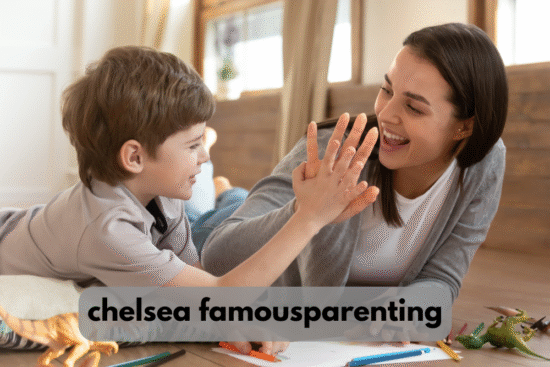Chelsea FamousParenting is about calm, clear parenting that fits real life. This approach blends simple routines with firm but kind limits. It asks parents to trade perfection for practice. The result is less yelling, fewer power struggles, and more calm moments. In this article you will find practical steps you can start this week.
You will learn to build routines that stick, to set fair boundaries, to coach feelings, to manage screen time, and to protect your own time and energy. Each section gives clear examples you can use today. The aim is people-first advice that works for families across the United States and beyond and that respects the mess and the rewards of raising kids. The approach also speaks to the real mom life FamousParenting covers every day.
Build Simple Daily Routines That Stick

A routine gives kids a map for the day. It reduces friction and makes rules easier to follow. Start with two routines that matter most. Pick morning and bedtime. Keep them short and predictable. Mornings might include waking up, bathroom, dressing, breakfast, and one task the child owns. Bedtime might include quiet time, books, teeth, and lights out. Use the same words every day so kids learn expectations faster.
Make routines realistic for your life. If mornings are rushed, keep tasks under ten minutes. Let kids pick one small thing each day. That keeps them involved and less resistant. Use a simple visual cue so nonreaders can follow. A picture chart on the wall is enough. Praise once the child finishes a step. Short praise works better than long lectures.
If a routine breaks down, check one thing at a time. Ask what caused the slip. Did bedtime start too late? Did the morning snack take too long? Fix the single cause and try again. Track small wins for a week. Routines build trust more than control. Over time kids will act with less prompting, and your home will run smoother. This is a core idea in Chelsea acton FamousParenting.
Choose Gentle Discipline and Clear Boundaries
Boundaries need to be clear and calm. Gentle discipline means no yelling and no bribes. It means naming the limit and following through. Say whatever is and is not acceptable. Use simple language. Keep consequences short and consistent. A youngster who tosses a toy, for instance, will temporarily lose that object until they are able to demonstrate safe play. Return the toy when they try again. This teaches cause and effect.
Avoid long lectures. Short phrases work best. Use this pattern: name feeling, state rule, and show consequence. For example, say I see you are angry. Hands are for gentle play. If you throw the block, it goes in timeout for five minutes. Then pause and let the child respond. Consistency matters more than the size of the consequence. When you follow through calmly, kids learn to trust the structure. Chelsea FamousParenting builds this consistency into daily life.
Teach repair after the consequence. Ask the child to fix what was broken or to say sorry in their words. Repairing is a key step that many guides skip. It helps kids learn empathy and the concrete skills to do better next time. Over time gentle discipline builds self-control without shaming. Many parents in the famousparenting momlife community say this is the step that changed their homes.
Coach Feelings and Build Emotional Skills

Emotions drive behavior. Teaching words for feelings makes behavior easier to manage. Use short labels like “mad,” “sad,” “tired,” and “proud.” Say the label when you see it. For example, say, “You look frustrated,” instead of “You are bad.” This minor adjustment moves the emphasis from blaming to learning.
Create a feelings corner with a few simple tools. A pillow, a small book, and a feeling chart work well. When a child starts to melt down guide them to the corner. Sit with them for a minute. Model a breath and say, “I take three deep breaths with you.” Keep the moment brief and steady. Long lectures can make emotions worse.
Turn tantrums into teaching moments after the child calms. Talk about what happened in one or two sentences. Keep it short. Name the feeling and offer one strategy for next time. For example, next time when you are angry, Squeezing a ball or stomping your feet are two options. Rehearse the strategy when both of you are calm so the child knows what to do later. These are core parts of Chelsea FamousParenting.
Manage Screen Time and Digital Safety
Screens are part of life. The goal is to use it with purpose and not as a default. Start with clear family rules that everyone knows. For example, no screens during meals, no devices in bedrooms, and a set time for shows. Keep the rules few and simple so kids can remember them.
Teach kids what they can watch and why. Co-watch with young children and talk about the story. Older kids benefit from limits that match their age and maturity. Replace some screen time with short family activities. A quick walk after dinner or a five-minute shared game works better than a long lecture.
Set up device boundaries that make rules easier. Chargers should be kept in a shared space overnight. Use a single-family tablet for certain shows and set a timer. If a rule is broken, apply a short consequence and then return to the routine. The aim is to make tech usable without letting it run the house. Chelsea FamousParenting treats digital safety as part of everyday life. You can even find more practical examples on famousparenting.com where real parents share routines.
Balance Work Life and Self-Care

Both job and parenthood are hard. Protecting a small block of time for yourself helps keep patience and energy. Self-care does not need to be long. A ten-minute walk, a short breathing break, or a focused cup of tea is enough to reset. The point is regular practice, not perfection.
Guard family time too. Simple rituals help. A five-minute check-in after school, a shared song at dinner, or a short bedtime story can hold family connection even on busy days. Never be afraid to seek for help when you need it. Trading a pickup with neighbors or swapping babysitting for friends allows you some time for recharging. Little by little, all such measures will eventually amount to great help.
When work demands increase, be honest with the family about the plan. Tell children that this week’s work needs more time and name a small thing you will still do with them. Consistency in a small area keeps security even when schedules flex. This is another foundation of Chelsea FamousParenting.
Build Support and Community That Lasts
Going it alone is harder when raising a child. Investigate local communities, attend school activities, and trust online forums where real parents share real victories and real struggles. It’s okay to have three or four other parents as friends. Share practical swaps like carpooling or trading short babysits. These swaps are more useful than general advice.
When you meet new parents, keep the exchange simple. Offer a time you can help and ask what they need. Building trust faster than doing any one-off favor is in the little, ongoing trade.The goal is reliable help. Talk to your pediatrician or local libraries about parenting programs. Libraries often have free events that bring families together. Chelsea FamousParenting emphasizes community as part of family strength. This reflects how mom FamousParenting builds local circles for support.
Practical Sample Week and Small Routines You Can Copy
Pick three routines to try for one week. A morning routine that includes one task the child owns, a calm bedtime that starts 20 minutes earlier, and a short after-school check-in work well together. Keep each routine under ten minutes so they are realistic.
Each routine should include a brief plan that is posted for the family to see. Track the week and note two wins. Celebrate those wins with a small family ritual such as a favorite song at bedtime. This keeps momentum without pressure. This is exactly how Chelsea FamousParenting suggests you build habits.
Common Challenges and How to Adapt FamousParenting to Your Life
No plan fits every family perfectly. If a routine fails in week one, tweak one thing and try again. If a child resists a new rule, start with a shorter consequence so success is easier. For parents who work nights, flip the routines so mornings are more flexible and evenings hold the anchor.
If stress feels chronic, reach out to your doctor or a counselor. Asking for support is a practical step, not a failure. If your child needs special help, look for local services that match their age and needs. Adaptation is part of the practice. Small adjustments keep the approach useful for years. This makes Chelsea FamousParenting flexible for real families.
Final Words and Simple Next Steps
Chelsea FamousParenting is plain and practical. It asks you to build a few routines, keep boundaries calm, teach feelings, manage screens with rules, and protect short blocks of time for yourself. The first step this week would be to start one routine, one clear rule, and one short self-care habit. The key to manifesting small wins and requesting one trade of help from a neighbor or friend will create less chaos and more connection. These little things accumulate over time. Remember, steady practice is of greater importance than perfect plans.
